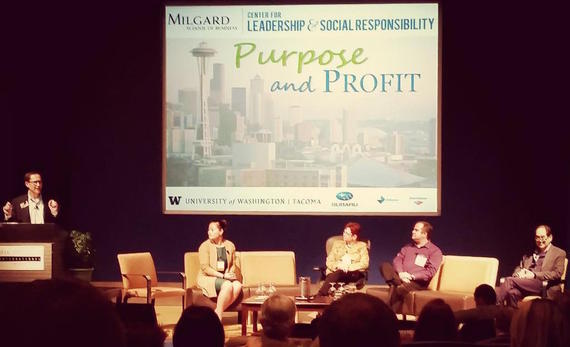During his keynote, Vik Sahney, REI DVP of Strategy and Sustainability, shared that "CSR is not about doing less bad, it's about changing the way you do everything". Done correctly, CSR can engage employees, boost profits, and make a measurable impact. Done incorrectly, it can simply earn your company's logo placement at a fancy event.
CSR is a notoriously slow-moving and under-funded, so it comes as no surprise that some of the greatest innovations in CSR are coming from smaller, nimbler organizations, and being demonstrated at smaller, nimbler conferences.
This last week, CSR leaders from the Pacific Northwest assembled in Seattle for the Purpose and Profit CSR Conference held by University of Washington Tacoma's Center for Leadership and Social Responsibility. While big names like Bank of America, REI, Subaru and Edelman took the stage, so did less-well-known regional market leaders.
A few simple lessons from this event show that CSR is evolving in ways that have massive potential to better scale positive impact, and help companies realize more profit in the process.
Competitors are Your Best CSR Allies
Short-sighted business make cuts to realize short-term gains in market share. These cuts are often at the expense of our planet and their people. While these practices make short-term gains, they lose in the long-run and are doomed for bankruptcy. Strategic businesses are comfortable to sustain market share, and instead work together with their competitors to grow the entire market. A great example of this is how K2, Patagonia, REI, and other outdoor retailers are working together on environmental issues and consider their competitors not as each other, but as other industries.
One of the quotes from the conference was that REI's biggest competitors aren't outdoor retailers, they are big box retailers because when people spend more time in front of electronics they spend less time in the great outdoors. As such, outdoor retailers have bonded together on projects like Protect Our Winters, which work to engage more people in the outdoors through sustainability campaigns and environmental education initiatives.
Integration is Better than Segregation
- Goal Setting: When individuals at all levels of the company set annual commitments, they should include sustainability practices in their goals.
- Measurement: No matter your position, you should be measuring sustainability-related data, and impact data, too.
- Employee Engagement: Don't view CSR and sustainability reporting as an obligation. View it as a tool to build partnerships, expand into new markets, innovate new products, and boost profits by engaging employees at all levels.
A great example of this came from Matt O'Laughlin at K2, who is now the Chair of its Sustainability Action Team. Seeing a major marketing opportunity around sustainability initiatives, he started as a one-person volunteer on sustainability, integrating new practices and reporting on his own position. He now has a team of 10 other volunteers working on integrating new practices into their on jobs, and throughout all their brands. This team has created improvements in sourcing, manufacturing, product development, events, and marketing.
Your Business is Reliant on Partners, and so is Your Impact
One of the salient messages that resonated throughout the conference was the importance of partnerships. However, unlike traditional CSR partnerships that are often with nonprofits, Valerie Bone, The Director of Corporate Responsibility at PMI, highlighted the importance of its suppliers and distributors. In essence, while all companies are expected to manage their own operations more sustainability, the best companies actually push on their upstream and downstream partners to adopt CSR initiatives to create a larger impact.
As sustainability consultant Sarah Severn shared, this not only allows your own company to improve its overall impact, but it also can also impact other companies in other industries that happen to use the same suppliers or distributors.
Companies Can Do More by Empowering Their Employees than by Forcing Them
While companies like the marketing stories that come from global days-of-service, employee reactions are often mediocre, especially when compared to the reports they share from the cause-related activities they initiate on their own. Edelman's Business + Social Purpose team shared that the key was to align business objectives to volunteering and giving campaigns and then providing a framework for employees to step up and be empower. This is a proven way of amplifying high-impact activities that engage employees, improve performance, and create a positive change.
CSR Shouldn't be Hard
One of the unexpected highlights from the conference came when an audience member asked, "How do you explain the future of CSR to a 5-year-old?" Here is an analogy that is sure to relate to the picky eating habits rampant at that age... Just because vegetables are good for you, doesn't mean you eat enough. But if vegetables tasted better and looked better, would you eat more of them? Of course! The future of CSR is the same... if business leaders see how helping others (eating vegetables) actually provide more benefits to the business, they'll do more of it. For those of us in the CSR field, it's our job to show that purpose can really help generate profits.
As Colleen Olphert of the Boston College Center for Corporate Citizenship team shared, "Purpose is everything. It can drive innovation, engage employees, and move businesses forward... and that is why everyone throughout the business needs to be thinking about social impact".
If you missed the conference, I strongly urge you to follow along for next year's!

